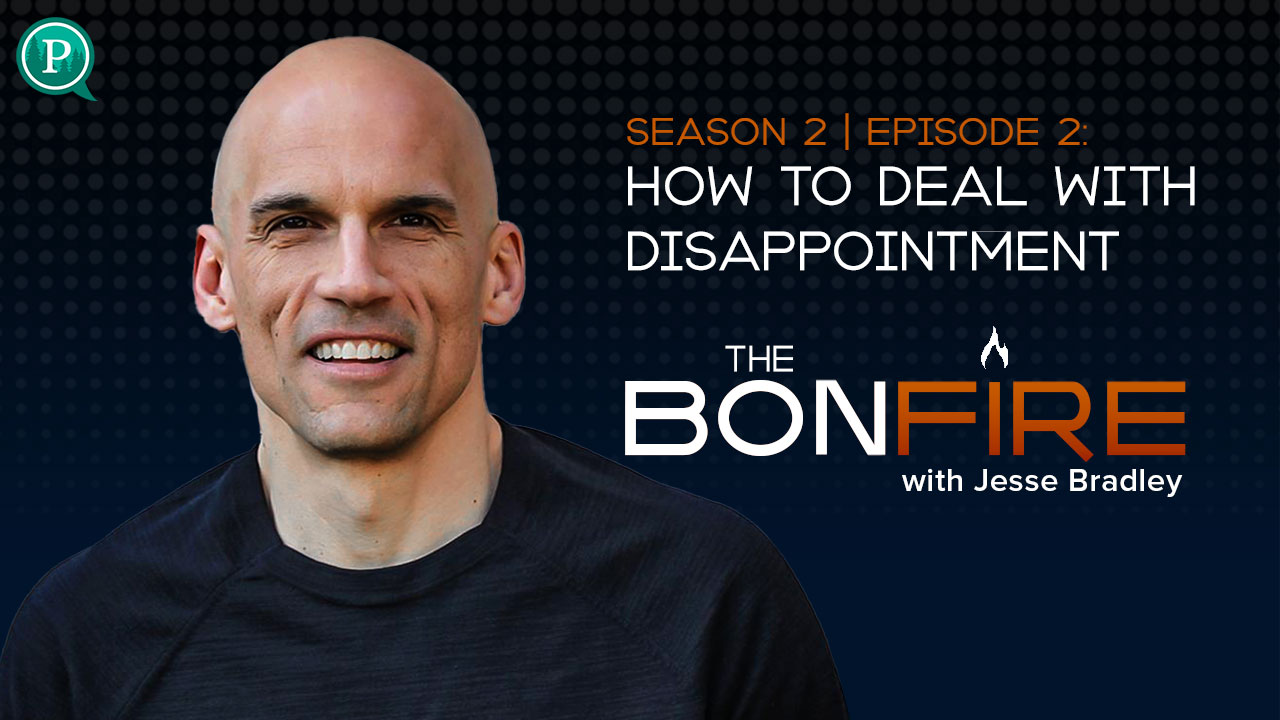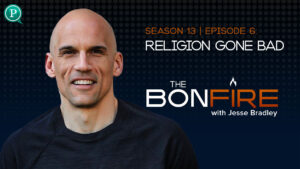Deep disappointment is common. It can be linked to situations, relationships, outcomes, expectations, and broken promises. This episode looks at 1 Samuel: 30 and David’s disappointment. What did he learn during this time about how to receive from God? What habit did he cultivate that changed how he walked through disappointment? Let’s learn together how we can receive from God during our lowest points.
If this resonates with you, please rate, review, and subscribe where you listen to podcasts. For updates follow me @jessejbradley on all socials and for the latest videos check out my YouTube channel Jesse Bradley. The best is yet to come!
Show Notes:
- Deep disappointment is common.
- It can be linked to situation, relationships, outcomes, expectations, and broken promises.
- First, Samuel, 30 and David’s disappointment
- Houses were burned down, wives and kids taken captive, and David’s friends wanted to kill him
- David learned how to receive from God. He cultivated that habit.
- Prayer is the hinge.
- God’s presence is the hinge.
- A hinge is something that appears to be small which can move big objects.
- In your darkest days continue to abide, cling to God, drawn, ear, caster, anxiety on him, and thank him.
- What is your go to?
- No one can take away that access or that place where you meet with God.
- Habits are learned.
- Your character and faith develops in disappointment.
- Leaders need to go deeper than the people around them.
- You can only lead people as deep as you go. Depths with God is greater than your disappointment.
- Psalm 73 is loaded with this appointment until Asaph meet with God.
- David’s turnaround includes a rescue and restoration.
- Lives are spared, and families are brought together again.
- He had been waiting for over 10 years, and became king.
- Your inner life is more important than your circumstances.
- God wants to bring renewal in the darkest days.
- It’s important to grieve, but there’s a hope greater than a grief.
- Hope is relational and habitual.
- Hope is a confident and joyful trust in someone or some thing.
- We walk with the god of all hope who never runs out.
- God has a whole greater than your challenges.
- Learn how to receive from God in your lowest points.
Special thanks to World Concern for sponsoring The Bonfire Podcast.
Transcription:
Purposely. Your life, God’s purpose. Listen at onpurposely.com.
Pastor Jesse Bradley:
There’s a habit that you can cultivate that’ll renew your mind and transform your life. And that’s the reason I wrote The Power of the Second Thought.
My professional soccer career ended with a tragic illness in Africa. I was fighting for my life for one year, and it took 10 years to fully recover. I just didn’t have a roadmap, I didn’t have the tools. I didn’t know how to take the next step forward. I didn’t find hope until I lost it.
And I discovered that hope is available to everyone. That hope and abundance is relational, it’s also habitual. And there’s an indestructible hope that’s greater than the challenges that we face.
Maybe you’re navigating some detours and difficulties right now, and you need some direction. Check out the book, look at the information below.
Welcome to the Bonfire. God is love, god is light. God is a consuming fire, and God’s presence is our joy. That’s why we gather together at the bonfire. That’s what this podcast is all about.
And as we’ve been journeying together, and continue to learn together, grow in our faith together, draw nearer to God together, we’re in season two. And season two has a lot of specific situations. Today we’re going to talk about disappointment.
Disappointment is something we can all relate to. And sometimes disappointment is almost an understatement. It’s bigger than that. It’s like a dump truck comes and unloads a massive amount of disappointment that you never wanted. Sometimes you don’t see it coming. Life isn’t going to be the same. And it can come from a lot of different directions.
Sometimes you had expectations that you’d be at a certain point in life at this age or this stage, but it hasn’t happened yet.
Or it could be in your marriage, or in a dating relationship. Could be in your finances, your job, your career. Could be in your faith. Even as you look up to God, you thought things were going to be different. There can be a lot of levels and layers of disappointment. And sometimes in the faith community, there’s an expectation that you’re not really going to be disappointed.
If you show disappointment, it might be seen as you’re less than other people. And consequently, people stuff their disappointment, they’re in denial, they act like they don’t have any, and they just try to smile on the outside. But I believe God has a deeper work than just an outside smile, a bandaid approach to disappointment. I believe that God meets us in the depths, and God does his greatest work in the most difficult and darkest moments.
We’re going to journey together with, how do you deal with disappointment?
And I think back to my own life. I had disappointment as a child, seven years old, when my parents were divorced and it was out of my control. And I had disappointment when the top college I wanted to get into, I got that short letter of denial.
And disappointment continued in different ways. There was disappointment when my soccer career ended. I was fighting for my life for one year, it took 10 years to fully recover. And ministry is not a cakewalk. As a pastor, I’ve had so many rounds of disappointment. And then also trying to enter into other people’s disappointment. And care and understand.
So disappointment has been a familiar theme. And that doesn’t mean you’re less loved by God, or you’re less spiritual. Life gets very challenging. Jesus said in this life, we’re going to have trouble. But take heart that he has overcome the world. And that kind of overcoming, we grieve, but we have a hope that’s greater than our disappointment.
When you think about disappointment, there’s different passages in the Bible that stand out. One that’s always encouraged me is in First Samuel, chapter 30. And the situation is kind of intense. Because David is the leader, and it’s not going how he hoped it would go. In fact, he and some of the men are returning to Ziklag. That was the city where their dwelling was.
And while they were away, the Amalekites came in, invaded, burned down the city, and took captive their wives and their children.
David is with all the men, returning. And as they see the condition of the city, they’re distressed. And especially because their wives and daughters, their families are gone. Taken captive. They don’t know if their families are killed, or if they’re okay, or what’s going on. Can you imagine coming back to your house burned down, all the houses burned down, and your family’s missing?
And not only are the men distressed, but then they turn against David. This group of men turns to David and they start thinking about stoning him.
You know how there’s a scapegoat when things go wrong? When life doesn’t work out how people want, they’ll look to blame someone. They’ll look for a punching bag. They’ll look for someone that they can take out all their frustrations, their disappointment, their anger and try to land it on someone. Frequently, it’s the leader. And in this case, it’s David.
They’re questioning, if we wouldn’t have followed David, if David wouldn’t have picked Ziklag, if David was better in terms of protecting, if David had a plan, if David wouldn’t have been away from the city, it’s all going David’s direction.
And what do you do at that moment where you’re personally feeling crushed? And then in addition to that, you’re taking on the waves of other people’s disappointment, all directed at you, and a lot of times it’s not even fair.
See, disappointments related to relationships. These are people he loves, he’s battled with. Disappointment is linked to results, it’s linked to loss. It’s linked to even challenges with our faith. Disappointment is linked to a lot of different things. And David is sorting through all of that. And there’s a defining moment in David’s life.
In First Samuel, chapter 30, there’s a key phrase. And this phrase is kind of like a hinge. There’s a hinge in our walk with God. There are moments, there’s kairos, which is a Greek word for time. Chronology is linear, time. Kairos, certain special moments. They’re windows, they’re opportunities from heaven.
And in those moments, they’re defining moments in our lives. And you have some of those, kairos moments, defining moments, hinge moments. Where everything’s going one way. Everything’s going the wrong direction in this scene.
And yet, David, here’s the phrase, found strength in God. David learned. This became a habit. He learned how to find strength in God. He learned how to receive from God. This is true in so many of David’s situations. Military battles, battles against Goliath. He’s overlooked by the prophet to be the next king. His own family looks down upon him.
There’s time and time again where David has learned, because the people around him don’t understand. They’re against, they’re negative, they’re throwing shade. He’s learned where to go when life gets really disappointing.
And that’s what I want to highlight today, that you have a go-to when there’s disappointment. You’re going to go to the food, or you’re going to go to the bottle, or you’re going to go to a friend to complain. You’re going to pick a lot of different things, different go-tos. But the one go-to that’s going to bring more healing than anything else, and more strength, is to go to God. Go to his presence.
Do you drop to your knees? How’s your receiver? Are you receiving the encouragement and the strength God wants to give you? Are you receiving his comfort, his love? In your most disappointing areas of your life right now, are you open to God? Are you finding strength in God? Encouragement, purpose from God? How are you doing with your receiving?
And why I like the phrase abide respond is because abiding is receiving. And then responding is acting on what you’ve received. And the abiding is the nearness and the closeness. When you’re going through a disappointing time, abide with Jesus.
The Bible says, “When you abide, you’re going to bear much fruit.” God makes it clear. Draw near to him, he will draw near to you. God says, “Cling to him, his right hand will uphold you.” That Psalm 63.
James chapter four is the promise, “Draw near to God. He’ll draw near to you.”
“Cast your anxiety, your burdens, your disappointment. Cast it on God, he will carry it and he will carry you.” First Peter, chapter five.
There are so many expressions of the same experience. And when you’re disappointed, having a go-to. “God is our refuge, strength, and ever-present help in trouble.” Psalm 46.
And to have these answers, there’s scripture, that renew our minds. But then also drop to our heart for healing. And then in addition to that, our soul can still be on fire. You can have so much of God’s presence in your most disappointing times.
Now, will you grieve? Yes, you’re going to grieve. That’s natural, that’s healthy, that’s spiritual. That’s part of disappointment. Don’t go down the road of denial. But instead, know that you can grieve and God’s going to enter into that grief. Then receive his hope, receive his strength.
What happens to David is he receives strength. David gathers about 600 men. See, first he takes their criticism, takes their negativity. And because he has strengths from God, he’s going deeper than everyone else.
If you’re a leader, part of your calling is to go deeper. Go deeper, maybe, than the people around you. You’re not going to take people deeper in Jesus than you go in Jesus. And if you don’t have that depth in Jesus, when the disappointment’s deep, you’ve got to go deeper than the disappointment.
The disappointment’s going to run deep, but you can’t have a shallow walk with God. Because you’re not going to receive what you need from the Lord. The Lord will give you everything you need for life and godliness. His grace will be sufficient in the disappointment, but you’ve got to go deep and receive it.
And when you go deep with God … David would pour his heart to God. David would open up his life to God. David would receive from God grace, and mercy, and forgiveness, and new direction and new vision. And he goes there with God. That depth, part of the depth came from pain. Pain can drive you deep with God. Disappointment can drive you deeper with God. Keep growing with God. Keep going deeper with God.
As a leader, David grows deep. And because he has that depth, he’s able to reenter the relationships and redirect the people. He redirects these 600 men and says, “Guys, this is time for a rescue.” And he inquires of the Lord. Just because he is experienced in the military and in battles, he doesn’t assume he knows the plan.
Just because you’re experienced, listen, that can become a false sense of complacency. David doesn’t fall into that trap. He inquires of the Lord. “Lord, should I go? Should I go right now? God, what should we do? We’re surrounded by disappointment. Disappointment’s saturated our community right now. What should we do?”
Inquires of the Lord. God says go. 600 men and David, they go, they rescue. Rescue their families. It’s not too late, the story’s not over. Disappointment doesn’t have the final say. Disappointment isn’t your identity. Disappointment bows down to Jesus. So they go, there’s rescue, there’s restoration. Not every story ends this well, but this one, it has a great ending.
Because as that restoration happens, David is going to regain some respect. And God moves powerfully. And God is going to get the glory. And lives are spared. It takes courage. When you think about missions, and human trafficking, and bringing clean water, and risking your life, and traveling to dangerous places, you need to know, where is the Lord sending you?
And in the middle of the disappointment, how is God redeeming? What does God want to restore in the middle of the discipline?
For generations, children and families in the poorest places in the world have struggled to find clean water, food, and a chance for A brighter future. But all that can change in this generation. You can be part of the solution. Go to worldconcern.org.
As you participate, this is what will happen. Villages will be transformed far beyond Where the road ends, and children and families Will receive the love of Christ. You can make a difference. Go to worldconcern.org. Let’s be part of the solution together.
As you read through the Bible, there’s a lot of different hinges. Peters, he’s in prison and he’s in trouble. He’s probably on the path to be killed soon. And yet, what’s the hinge? The Bible says, “Yet the church was praying for Peter.”
There’s the hinge. People were seeking God and praying in the middle of the disappointment. And God rescued Peter from prison.
There was a battle happening. What was the hinge? Moses had his arms lifted up in prayer. When he dropped his arms, the battle would change, and Joshua and the troops would start losing. But the hinge was Moses lifting up his arms. Reliance on the Lord is a hinge. Prayer is a hinge. Prayer is a mighty hinge.
Your prayers are powerful. Prayers are powerful and effective. And when you pray, God listens. God moves. Don’t be shy about bringing that together with other people.
It’s great when people pray for you. It’s even more powerful when they pray with you. Have people pray for you in your disappointment, and watch what God will do to deliver, to provide, to protect. And in the Bible, over and over again, there’ll be a hinge.
But, God. In Psalm 73, Asaph feels like life isn’t fair. There’s injustice. People who reject God, who are cruel, seem to be advancing and seem to have so many blessings. And the people who trust God, walk with God. It looks like they’re just forgotten.
And none of this makes sense until he goes to the sanctuary. And cries out to God, and seeks God. And then God meets him there. God will meet you there in prayer, in honest prayer, raw prayer. And in your disappointment. You lay your soul bare, and that makes room. There’s often no healing until the revealing.
And that takes a step of courage to bring that to God. And that’s the hinge. So often in prayer, that’ll be a hinge that begins to turn around. You’ll see a setback, and then a hinge, and then a comeback. You’ll see that theme throughout the Bible. Setback, a hinge, and then the comeback.
And the hinge is seeking God. The hinge is prayer. The hinge is surrender. And in your disappointment, I encourage you to do that today. Do that right now. Take some time in that hinge, defining moment in your disappointment. Identify the disappointment, grieve, and then enter in. Go to God, and then watch what God will do. Abide with God.
Here’s a beautiful aspect of the story with David. And this encourages me so much when it comes to waiting. Because I’ll be honest, a lot of times waiting, that’s the most disappointing time.
It’s not here yet, or you don’t even know if it’s going to come. And you’re walking by faith, and it’s an uncertain path ahead. And the thing you want so much, it’s not here yet, and you don’t know if it’s coming. And what do you do with that tension and that disappointment? Do you fully grieve? Do you partially grieve? Is it delayed grief? Where is God in this? What’s God’s plan? Is this God’s best?
And you’re thinking through all of that. And David had many years of waiting. He was anointed to be king. And then for over 10 years, there’s a time of waiting. There’s so much disappointment in that decade. The King Saul trying to kill David. David is on the run. He’s in caves.
So here’s how it’s connected to First Samuel, chapter 30. When David has this breakthrough and the rescue happens, he is just on the verge of becoming king. Do you see how much, when the hinge happens, how much is connected? The blessings that are connected? The blessings that started to pour out from that hinge verse, David found strength in God. David had clear direction from God. David had courage for the rescue.
David regained the trust of the 600 who wanted to kill him. They felt like they wanted to kill him. David forgave them. David rescued the families. And so the wives, the children, the restoration happens. Their city’s still burned down. So it’s not like there’s no damage. But then shortly after that, very shortly, it was really a matter of days, David was then promoted to be king.
And in your disappointment, trust God. Walk through the valley of the shadow of death. Don’t stop there. Jesus is our example. And Jesus had so much disappointment. I mean, he looked down from heaven and saw the sin on the earth.
But what did he do? He kept trusting the Father’s plan, trusting the Father. And he came to earth. And then you look at the 12, and how many times was Jesus disappointed? Just when you think the 12 make a couple steps forward, they fall back. And just when you think they’re going to trust God, they have fear. And just when they start to walk in water, they sink. And just when Jesus tells them to pray, they fall asleep in Gethsemane.
Jesus is constantly let down by the ones he’s entrusting the mission to. The ones he disciples and trains. He invests all his time and energy. You might feel that way. If Jesus felt that way, you might feel that way. And you’re calling, there’s opposition. You have people who want to kill Jesus constantly. You’ve got death threats. You’ve got his own that he trusts that are flailing.
There’s disappointment coming from every direction. And what does Jesus continually do? Go to the Father and abide. Jesus often would, early in the morning, get alone with the Father. Why would he do that? I think part of it was the preparation for all the disappointment that’s going to come that day.
And when you have a rich time with God, when you have closeness with God, things hit you differently. I know if I drift from God and a challenge comes, it hits me so much harder than if I’m close with God, walking with God, trusting God. Have a Bible verse in my mind, thanking God intentionally.
When I’m doing that and something comes, I just know the Holy Spirit’s greater. And God’s got this. And let’s go. We’re going to overcome this in the strength of the Lord. But when I drift from God … And this is what disappointment will do. Disappointment, and the devil gets in there, demons gets in there, darkness gets in there. Disappointment wants to pull you over to sin.
Disappointment wants to get you to doubt God. Disappointment wants to drive you further from God, and take you down. And disappointment will cause a lot of people to drift.
Disappointment’s powerful. We are emotional beings, and we feel the disappointment. And our emotions, our relationships, our faith. They’re all connected. And when we feel intense, big feelings, we like to say. When we have big feelings, when we’re just raising our kids we talk about big feelings. What do you do with big feelings?
All of us have big feelings. What do you do with those big feelings? And disappointment’s a powerful feeling, but you still have a choice. God wants to empower you. And even though there’s grief, there’s going to be hope. When Jesus was at the funeral and there was grief and pain because Lazarus died, Jesus wept. And the others wept. And it’s important to weep.
You’re not less spiritual when you weep. It’s healthy to grieve. And yet, there was a hope greater than the grief. And the disappointment that Lazarus’s sisters had. Mary and Martha, they were disappointed with Jesus. “You took too long, where were you? Lazarus is dead.” They want to take it out on Jesus.
And yet, what does Jesus do? He grieves and also he says, “I’m the resurrection of life. Whoever believes in me will not perish, but have eternal life.” Then he walks over to Lazarus in the grave and he says, “Lazarus, come forth.” And Lazarus is alive again. T.
Here’s a death, and then there’s the resurrection of Jesus. There’s disappointment in many levels, and then there’s a resurrection. The followers of Jesus were disappointed. They didn’t want their savior to die. Peter tried to talk them out of it, disappointment. And yet, the resurrection, it was necessary.
There is some necessary disappointment in life. Now, if you’re not following God and you’re rebelling, there’s going to be unnecessary disappointment. You don’t want the unnecessary disappointment. There’s already enough disappointment. But there’s going to be times when you are faithful to God, and life is very disappointing. You’re going to be faithful to God and people are very disappointing. Situations are disappointing. And the expectations you had are not playing out.
Those are the defining moments that test your faith. And I’m encouraging you today to go deep. To grow, to mature, to abide, to draw near to God. To give him your burdens. To continue to thank God, and praise God. Because when you do that, the light that God gives you is going to shine, and the darkness won’t overcome it. The darkest times, God is still with you.
Joseph was thrown into prison in the Old Testament for a crime He didn’t commit. And we keep reading, God was with him. God was with him. God was with him.
What I’m really trying to do in this time together today, and in this podcast, is highlight how good and powerful God’s presence really is. And that God’s presence is not just about when you’re at church, or in life group, or having a great devotion with your coffee and your chair. God is just as much there in the deepest darkest moments, when disappointment feels overwhelming. God will meet you there.
And in fact, when you meet God there, and I know from my 10 years of recovering, I was single until I was in my mid-thirties. That was disappointing. I thought for sure I may be married in my twenties. There’s just been a lot of different times where there’s been extended disappointment in something. I’ve tried to work through it, there’s no quick solution. There’s no fast-forward.
But I’ll say this. Those are the times when your faith is refined. You get real with God, you go deep with God, and this is what you learn. It’s your receiver. You learn how to receive. You learn how to receive.
That’s the habit I’m highlighting today from David. He found strength in God. And some people learn how to receive and other people don’t. There’s a lot of reasons you can block what God’s trying to bring to you. A big one’s pride. But on the flip side of pride, I don’t need God. The flip side is despair.
God can’t do anything. He’s not that great. Those are the two extremes to avoid. But the middle road, teachable, humble, ready to receive. God wants to pour out wisdom today. God wants to pour out encouragement today. God wants to give you the courage you need to make the right choices.
God wants to pour out his grace and mercy in your life. And God will bring a provision that’s greater than the disappointment. I’m not saying the disappointment’s small, I’m not saying it’s going to go away quickly, necessarily. But God’s provision will be greater than your disappointment. And the stories that come out of it will be amazing.
People will be inspired by your faithfulness and trust when they know that you’re working through so much disappointment. The people who inspire me are the ones who face massive amounts of disappointment, and they just keep walking with God, clinging to God, trusting God. And God, they receive from God. And God fills them up. And with tears, they weep and grieve. But then with hope, that’s greater. And the hope from God is greater than the challenges we face. I’m convinced of that.
I didn’t know that when I started following God, but I learned that. And it took about 10 years, not that it was finished after 10 years, but it took about 10 years to really dive deep into the hope God gives. It’s a relational hope, and there’s habits you cultivate. And the habit today is receiving from God.
David found strength in God because he learned how to receive from God. And I encourage you today, surrender. This is how you receive. You surrender, teachable. You draw near, you ask. As you submit to God, drop your pride, and you say, “God, I need you.”
You might not have the perfect words. Jesus. Cry out, Jesus. Say, God, help me. It’s a cry. That’s what prayer is. And the receiving comes to anyone. God doesn’t turn people away who are contrite, who are humble. God doesn’t turn people away who seek him in prayer. And when you do, God has an abundance. Jesus has living water that’ll satisfy your soul.
When you think through David’s situation, you think through the disappointments that we all face, there’s the outer life and the inner life. And the outer life for David, he wasn’t king yet. He had a group of men that were disappointed. He had family, wives, and kids that were taken and captive. He had all kinds of questions about their condition, and didn’t have any information. He had people who wanted to kill him.
He was in a tough place, maybe the toughest point of his life. Tougher than Goliath. Goliath can hurt from a distance, and certainly could kill him, but when the people around you, the people you love the most, those are the ones that hurts the most when they turn against you. Or they’re coming against you in an unfair way, that’s what hurts the most. The people who you love the most, are closest to you, can hurt you the deepest.
And that’s what David’s experiencing. The disappointment was overwhelming his soul, and yet there’s an inner life. And David found strength in God. The inner life is where you have renewal. And you can have a healthy and vibrant inner life in the most difficult situations. And as you receive from God, he’s going to restore your inner life. Prayer, scripture, his presence.
And what he provides on the inside. The Bible says in Second Corinthians, chapter four, “We don’t fix our eyes on what is seen because that’s temporary. But what is unseen, that’s eternal.” And even though outwardly we’re wasting away, you might feel some disappointment as you age, that you don’t have the same quickness, and speed, and health. And your body’s not working the same way.
The reality is, outwardly we waste away. We live in temporary tents. Our bodies, they’re not going to last forever. But inwardly there’s a renewal, day by day. And I’ve seen people with cancer. I’ve seen people with Parkinson’s disease. I’ve seen people that are very sick in the hospital after car accidents, and their body is fighting to recover physically.
But internally, they’re inner life, it’s vibrant because of Jesus. And you might feel in the middle of your disappointment, you’ve lost hope. Today’s the day to regain hope. Read First Samuel, chapter 30. Read Psalm 73. Read John chapter 15 about abiding with Jesus. And let God, the God of all hope, Romans 15:13, renew your hope today.
Hope is relational. Hope is only as strong as the one in whom you trust. Hope is a joyful and confident trust in someone or something. You can trust God because he’s trustworthy. And what’s going to bring you out of the disappointment is the grace and faithfulness of God. It’s because God keeps his word and his promises, and he will never leave you or forsake you.
It is the grace of God. Because even if you’ve messed up, there’s forgiveness for your sins. This is what’s found in Jesus. And Jesus, over and over again, arrives at difficult, disappointing situations. And either delivers people, or drives away the darkness.
And in the middle of that, people feel loved. And when you feel love, a love that’s greater than your disappointment, you’re going to have that renewal in the inner life. And that’s what God offers today.
So be encouraged in those times of disappointment. Remember, God hasn’t forsaken you. He’s still there. He’s still good. He still has a plan. Don’t give disappointment too much power. Don’t give it too much power, don’t deny it. But draw near to God.
That’s my heart today from the bonfire. If you could share with friends, if you know someone who’s going through a hard time right now, just share this message with them, that they could have some time with God. They could look at scripture, and they can grow in their faith, and they can know how loved they are.
And we want to continue, in this season, to talk about specific situations. If you have any topics he wants to cover, let us know. And we’re going to go deep in the Word. And as we gather around the bonfire, God is love. God is light. God is a consuming fire. And we’re so grateful for God’s presence.
Thanks so much for subscribing to the podcast. Rate and review, definitely helps us reach more people. Let’s keep growing together. And as we spread God’s hope, it’s a hope that’s greater than our disappointments.
Follow this podcast:








